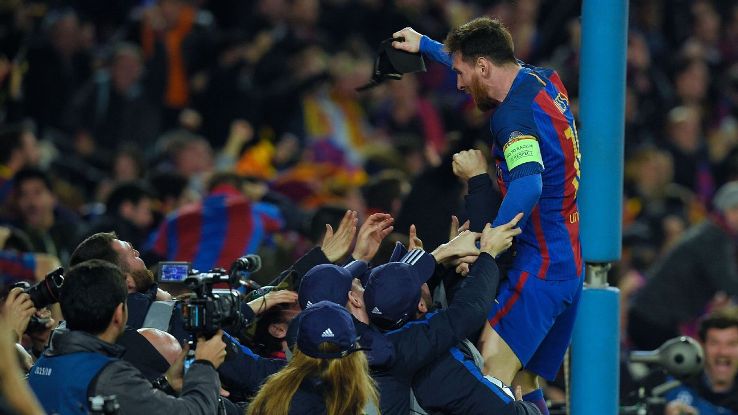Barcelona’s improbable comeback was a reminder of sport’s ability to enthrall – ESPN FC (blog)






Yes, it happened. And they’ll be talking about it for years to come.
No team in the history of European competition — from the time that Sporting Lisbon and Partizan Belgrade drew 3-3 in the first ever European Cup game back on Sep. 4, 1955, to this past Tuesday night — had ever overturned a 4-0 first leg deficit.
Not in the European Cup, not in the Champions League. Not in the Cup Winners’ Cup. Not in the Inter-City Fairs Cup, UEFA Cup or Europa League. Not even in the InterToto Cup.
Not on the past 185 occasions that such a scenario has existed.
That fact alone would make what Barcelona achieved against Paris Saint-Germain a game of improbabilities.
But there’s more.
There were the three goals in seven minutes. And the two goals in injury-time. Not unprecedented, but extremely rare nonetheless. That both would occur in the same game, well, we’re talking not needles in haystacks, but diamonds-in-Sahara-desert rare.
Then there’s the fact that PSG had never, in any competition, conceded more than the six goals they gave up on Wednesday night. Or that their manager Unai Emery had won his last 13 two-legged ties in European competition; indeed, he had won 20 of his last 21 home-and-away ties in all competitions.
Then there’s the fact that Luis Enrique, the Barcelona manager, is leaving his position at the end of the season. Lame ducks can flap, but they rarely soar.
That’s the background. That’s the context. That’s the improbability of what transpired at the Camp Nou.
And that’s the narrative that will live on, certainly on a macro-level.
It becomes part of our shared history as football fans or, indeed, as sports fans. It’s not a coincidence that, after Ivan Rakitic referenced the New England Patriots’ Super Bowl win, we got tweets like this.
These are what used to be called “water cooler events,” which unite the hardcore Barcelona-supporting Cule, who sleeps wrapped in the Estelada flag and names his goldfish Lionel, Pep and Gamper and the Alabama football-supporting guy with the “Roll Tide” ringtone, whose dad named him Bear (after Bryant) and for whom national signing day is a religious holiday.
The former lived through every agonising second and is probably still wired and awake right now. The latter might have casaully crossed the highlights when they popped up on social media.
But what happened resonates with both, because everyone understands comebacks. Hope springs eternal and yet, in those circumstances, is almost universally dashed. It is stuff like this — and the rarity of it — that keeps us sports fans believing.

There’s also a more granular narrative. It doesn’t play well with the casual fan but, if you’re on this site and still reading this, then I’m guessing you know and care enough about football to understand what comes next.
Individual episodes attain outsized importance and you could count at least half a dozen incidents that went Barcelona’s way. If any one of them takes a different twist, things would have ended quite differently.
There were officiating decisions that could well have gone in PSG’s favour, with two of the most obvious being when Julian Draxler’s cross hit the outstretched arm of Javier Mascherano, and when Luis Suarez tumbled under pressure from Marquinhos, which led to the penalty that made it 5-1 to Barca.
Depending where you stand will dictate how you see it; my personal take is that the Marquinhos-on-Suarez incident should not have been given as a penalty while the Mascherano one, given the inconsistency in these situations, could have gone either way.
These were huge, split-second decisions that broke in a certain direction. It can happen: Flip a coin twice and there’s a 50 percent chance you’ll get two heads or two tails.
There’s also the randomness of individual, (largely) unforced errors. That applies to Kevin Trapp’s brain freeze on the first Barca goal, Layvin Kurzawa slicing the ball into his own net for the second and Thomas Meunier slipping on the turf and bringing down Neymar — with his head — for the penalty that made it 3-0.
Put simply, these were gifts because football is played by humans and humans make mistakes. Sometimes they make gross, wanton errors, not because they are bad players — Trapp, Kurzawa and Meunier won’t be mistaken for superstars any time soon, but these were slips of the kind that feel beyond your control — but simply because, occasionally, stuff just happens.
There were other errors, though maybe it’s best to describe them as missed opportunities that, on another day and in another circumstance, we expect to be converted, like the counter-attacking chances that fell to Edinson Cavani and Angel Di Maria.
Cavani also hit the post. As the old trope goes, it’s a game of inches. In this case, it’s a game of angles as well: Rotate the striker’s foot a degree or two at the moment of impact and Marc-Andre ter Stegen is beaten.
None of which is to diminish Barcelona’s achievement in any way. It will stand for the ages and the belief — especially after Cavani made it 3-1 — really was the stuff of champions. It’s entirely possible that, even if Luis Enrique wins another treble, we’ll be talking about Wednesday night more than we will about that.
This was also a reminder that great feats are built of individual blocks. Some of them you construct yourself. Some of them are gifted to you. Some should crumble under your weight but, for whatever reason, they don’t. Some of them fall from above.
Barcelona picked up all those blocks and built something beautiful and everlasting.
Gabriele Marcotti is a Senior Writer for ESPN FC. Follow him on Twitter @Marcotti.



